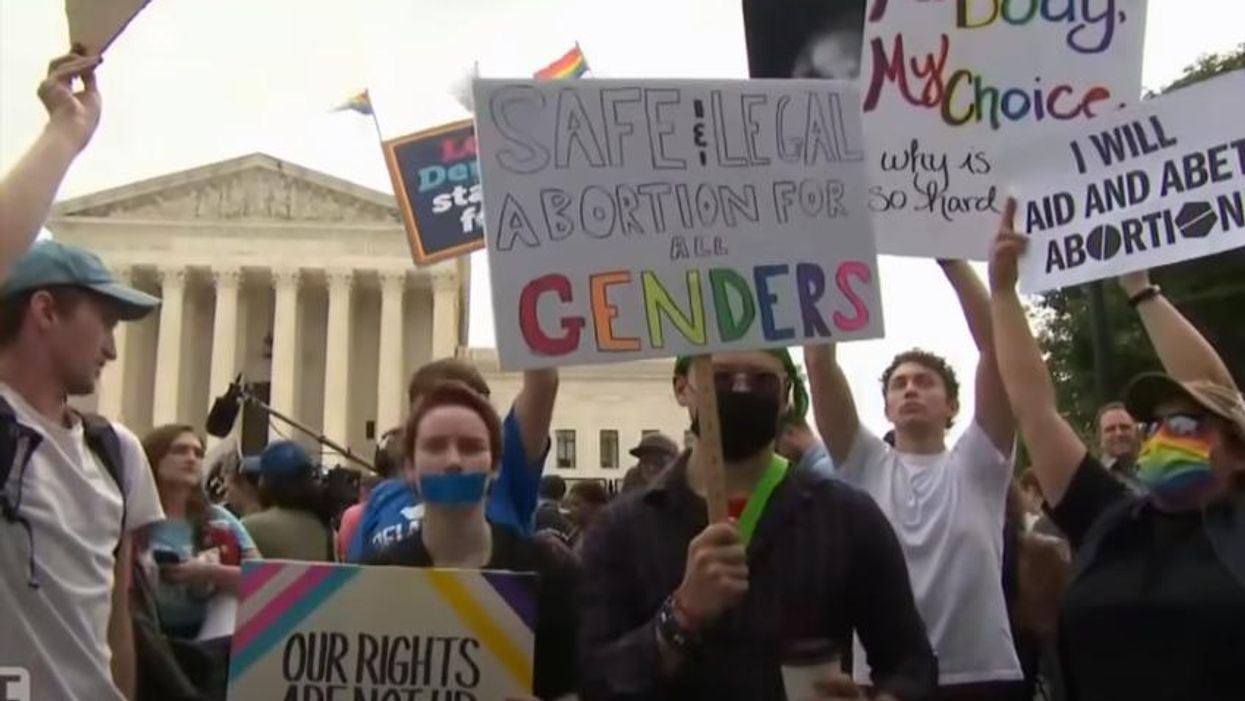Polls Show Democrats Energized In Midterm By Supreme Court Abortion Ruling

Abortion rights demonstration outside the Supreme Court in Washington, D.C.
For the last several months, nearly all political analysts have predicted November would be a blood bath for Democrats based on historical trends, President Joe Biden's low approval ratings, and polling data suggesting Republican voters were far more motivated to vote in November.
But fresh polling suggests the so-called enthusiasm gap got a jolting disruption in the wake of Friday's Supreme Court ruling gutting Roe v. Wade.
Two new polls from CBS News/YouGov and NPR/PBS Newshour/Marist suggest Democrats are far more likely to take their disgust to the polls following the high court's decision to strip the constitutional right to an abortion.
NPR writes that the issue injects "volatility into the 2022 midterms," citing the fact that 78 percent of Democrats say the court's ruling makes them more likely to vote this fall—24 points higher than the number of Republicans who say the same.
The CBS poll similarly found the decision yielded a 30-point advantage for Democrats, with more than twice as many Democratic voters as Republicans saying the ruling makes the more likely to vote in November.
The ruling is also particularly salient among groups that Democrats critically need to show up at the polls and support them: women, people of color, and college-educated voters.
The divide between college-educated voters and non-college voters is downright massive, with 69 percent of college graduates opposing the ruling, according to the NPR survey. But voters who didn't graduate from college are evenly divided on the matter, with 47 percent supporting the decision and 47 percent opposing.
Among women, 59 percent oppose the ruling while just 38 percent support it. In addition, 60 percent of nonwhites oppose the ruling while 54 percent of whites oppose it, according to NPR.
NPR also found a notable uptick in people who generally say they would prefer to vote for a Democratic congressional candidate over a Republican one, or what analysts commonly refer to as the “generic ballot.” In the survey, 48 percent now say they are more likely to vote for a Democrat in the fall while 41percent count themselves more likely to vote for a Republican. In April, Republicans led the survey’s generic ballot question poll 47 percent to 44 percent. Other polls have also found a shift toward Democrats in the generic ballot following the decision to overturn Roe.
All of these factors are positive signs for the Democratic Party, which was facing tough odds in November. While increased enthusiasm among Democratic voting blocs doesn't guarantee wins, it certainly gives Democrats a fighting chance. Midterms are won and lost based on which party’s base voters turn out (rather than persuasion). Democrats need to recreate the coalition of voters of color, women, and suburban voters who gave them a House majority in 2018 in order to compete this fall. The Supreme Court’s radical ruling upending 50 years of settled law on abortion is animating that exact coalition.
Reprinted with permission from Daily Kos.
- Danziger Draws - National Memo ›
- When Will Americans Push Back Against Tyranny Of The Minority? - National Memo ›
- Far-Right Bible-Thumpers Have Already Overplayed Their Hand - National Memo ›








